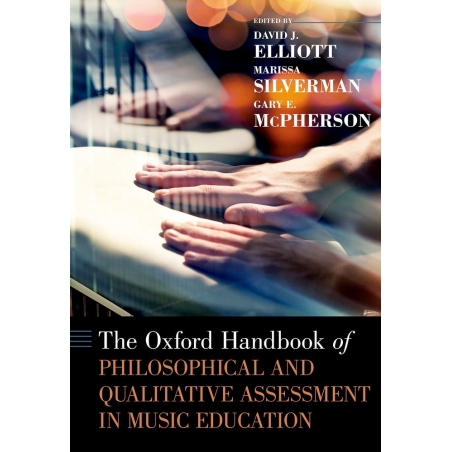The Oxford Handbook of Philosophical and Qualitative Assessment in Music Education offers critical perspectives on a wide range of conceptual and practical issues in music education assessment and evaluation as these apply to music education in schools and community settings.
CONTENTS
I. Foundational Considerations
1. Philosophical and qualitative perspectives on assessment in music education: Introduction, aims, and overview
David J. Elliott, Marissa Silverman, and Gary E. McPherson
2. Institutional music education and ranking as a form of subjectification: The merits of resistance and resilience
Lise C. Vaugeois
3. An ethical consideration of assessment in music education through the lens of Levinas Kathryn Jourdan and John Finney
4. The primacy of experience: Phenomenology, embodiment, and assessments in music education
Andrea Schiavio
5. Critically assessing forms of resistance in music education
Brent C. Talbot and Hakim Mohandas Amani Williams
6. Evaluation for equality: Applying a classical pragmatist perspective in qualitative assessment in Finnish general music education
Lauri Vakeva
7. Could there be Deleuzian assessment in music education?
Lauren Kapalka Richerme
II. Methodological Practices
8. Music teacher evaluation, teacher effectiveness, and marginalized populations:
A tale of cognitive dissonance and perverse incentives
Karen Salvador and Janice Krum
9. The influence of assessment on learning and teaching: Using assessment to enhance learning oHowSusan Hallam
10. The McDonald's metaphor: The case against assessing standards-based learning outcomes in music education
John Kratus
11. Habits of mind as a framework for assessment in music education
Jillian Hogan and Ellen Winner
12. Alternative assessment for music students with significant disabilities: Collaboration, inclusion, and transformation
Donald DeVito, Megan M. Sheridan, Jian-Jun Chen-Edmund, David Edmund, and Steven Bingham
13. A music-centered perspective on music therapy assessment
John Carpente and Kenneth Aigen
14. A case for integrative assessment from a Freirian perspective
Frank Abrahams
III. Creativity
15. Cultural imperialism and the assessment of creative work
Juniper Hill
16. Enter the feedback loop: Assessing music technology in music education with personal bests Adam Patrick Bell
17. Improvisation, enaction, and self-assessment
Dylan van der Schyff
18. Philosophy of assessment in popular music education
Bryan Powell and Gareth Dylan Smith
19. He sings with rhythm
he is from India: Children's drawings and the music classroom Roger Mantie and Beatriz Ilari
IV. International Perspectives
20. The assessment of classroom music in the lower secondary school: The English experience Martin Fautley
21. Imagining beyond ends-in-view: The ethics of assessment as valuation in Nepali music education
Danielle Shannon Treacy, Vilma Timonen, Alexis Anja Kallio, and Iman Shah
22. Assessment as care: A South African perspective
Janelize van der Merwe
23. Assessment and the dilemmas of a multi-ideological curriculum: The case of Norway
Sidsel Karlsen and Geir Johansen
24. Building a culture of ethical, comparable, authentic assessment: Music education in Queensland
Andrew Reid and Julie Ballantyne
25. Music as bildning: The impracticability of assessment within the Scandinavian educational tradition
Johan Soderman
26. Non-regulated assessment in music education: An urban Iranian outlook
Nasim Niknafs
27. International perspectives on assessment in music education
Alexandra Kertz-Welzel
Notes
Author Index
Subject Index




